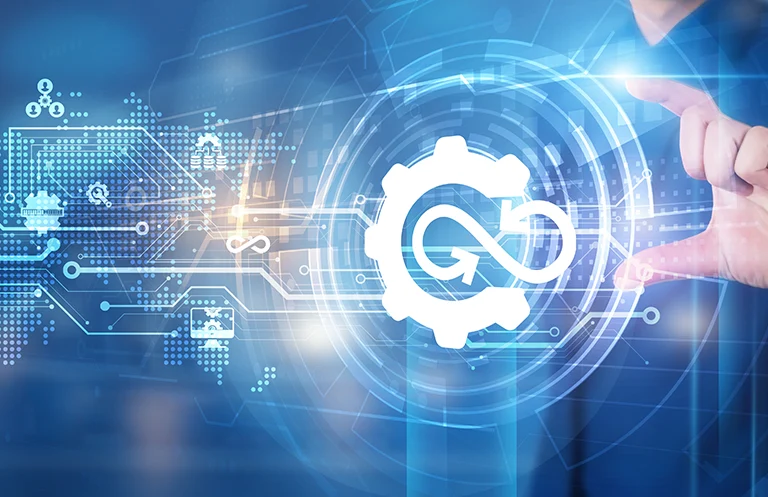The aerospace industry spans various levels of development, manufacturing, maintenance, and support of aircraft, spacecraft, and rotorcraft. It is a mission-critical industry, and its success depends on components that need to be highly reliable and accurate. Due to this, the industry needs to constantly improve its manufacturing processes, reduce labor costs and human errors, monitor the health of devices inside the aircraft, and effectively address safety issues.
Aerospace has always struggled to keep up with the latest technology trends due to its long regulatory cycles. All the bottlenecks mentioned above can be addressed by implementing Artificial Intelligence. The caveat here is that the algorithms need to be highly intelligent and reliable.
Artificial intelligence and its computational capabilities for data interpretation can streamline and simplify analytics, system management, customer service, and various other processes and activities. Artificial intelligence has already demonstrated promise in several other industries, such as banking, advertisement, retail, and health. Artificial intelligence (AI) in the aerospace industry can help companies streamline manufacturing while also addressing safety concerns. Further, AI systems can analyze inputs from various assets and process vast amounts of data faster than manually.
In this way, aerospace companies can carry out effective and faster inspections of various properties. The use of AI in aerospace can also help create a range of applications that can save/monitor fuel, boost operational performance, and assist in controlling air traffic. It has become crucial for business leaders to explore and leverage the benefits of Artificial Intelligence. Raytheon, General Dynamics, and Northrop Grumman have also announced AI-based development projects and product releases in recent years. Similarly, companies such as Lockheed Martin, Airbus, and Boeing have invested in AI startups through their venture arms.
Applications of Artificial Intelligence Systems in the Aerospace Industry
1. Smart Maintenance
Maintenance is essential to ensure the efficient functioning of the aircraft. Since servicing is typically conducted on a scheduled basis, the process can be time-consuming and incommodious. Unexpected glitches or malfunctions can result in a significant loss of resources and time. Since 45 percent of industry professionals see fixing unforeseen maintenance problems as a critical way to drive performance, it is no surprise that aviation businesses are increasingly looking into predictive maintenance facilitated by AI. Cloud-based applications have been used by Airbus for data processing, retrieval, and analysis to increase aircraft maintenance efficiency.
Predictive analytics sifts through data from sensors and reports, interpreting and sorting it. As a result, algorithms can detect and track possible faults in real-time and forecast the most appropriate repair times, resulting in more intelligent maintenance schedules.
RELATED BLOG
2. Better fuel efficiency
Aerospace companies place a high emphasis on fuel quality, and even a tiny decrease in aircraft fuel consumption can have a massive impact on a company’s bottom line and emissions. The standard commercial flight consumes approximately 4 liters per second, 240 liters per minute, and 14,400 liters per hour. We can cut fuel consumption by 5 to 7 percent with the aid of AI systems.
AI-powered systems assist in the reduction of fuel consumption. For instance, Safety Line, a French firm, has created a machine learning tool that can optimize climb profiles for pilots before each flight. Since the climbing process uses the most fuel, optimizing this stage results in significant fuel savings.
3. Better Customer Experience
Customer satisfaction and quality of service are especially critical for commercial aviation. AI is one of the ways that airlines can improve their customer engagement and deliver exemplary customer support. Chatbots are an example: AI-based automated platforms that can respond to consumer inquiries in real-time and human-like ways. By automating customer service, online chatbots can save customers time and effort. Some of the ways in which this can be achieved are:
- Accurate and Personalized Suggestion on Customer’s purchase decisions
- AI-assisted Chatbots offer efficient and friendly support.
- 24×7 Automated Assistance
- Streamline customer interactions
According to a SITA poll, 14 percent of airlines and 9% of airports currently use chatbots, with 68 percent of airlines planning to deploy AI-driven chatbots shortly.
4. Training
Artificial intelligence can be used to improve pilot training facilities by providing a suitable simulation environment to pilots. This is achieved using AI-enabled simulators in combination with virtual reality systems. These simulators may also capture and analyze practice data to create personalized training data using biometrics to monitor and predict individual performance.
Summary
AI and machine learning can provide the best customer experience possible through automation and self-service applications. It also enables aerospace companies to make better decisions about pricing and market positioning through the use of data. Machine learning incorporation in the aerospace industry ensures cost-effectiveness and safety. Employee workflow is being streamlined, and advanced aviation maintenance is ensuring greater air safety. AI also played a significant role in advancing the aerospace industry by offering helpful information that would otherwise be impossible to access by traditional approaches.
eInfochips has engaged with five of the world’s top 10 aerospace firms with key avionics capabilities (DO-178, DO-254, DO-160, DO-331, ARP-4754, and ITAR) to provide security-critical hardware and software solutions for commercial aircraft, military aircraft, and UAVs. We assist our customers in incorporating AI into their devices by leveraging our deep expertise in the domain and solid partnerships with all top AI hardware platforms. Also, we have extensive experience with several AI libraries and frameworks, including ML training algorithm creation, porting, optimization, and Installation. We have deep experience in several fields, including Device Engineering, Digital Engineering, and Quality Engineering.
Get in touch with us to know more about how eInfochips can help the aerospace industries in Artificial Intelligence and Machine learning techniques.











